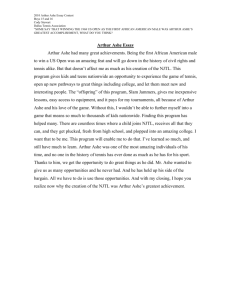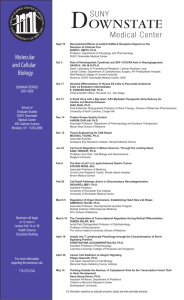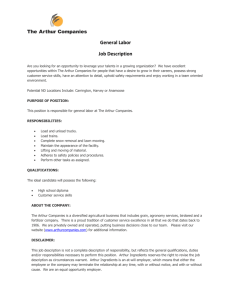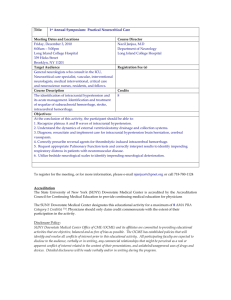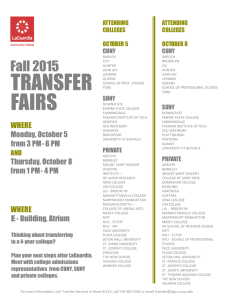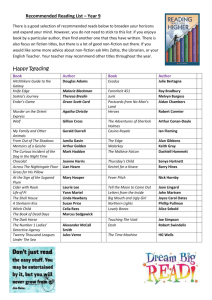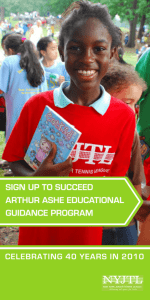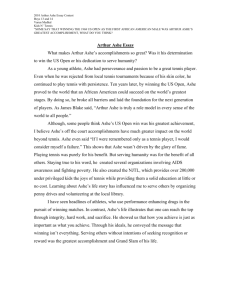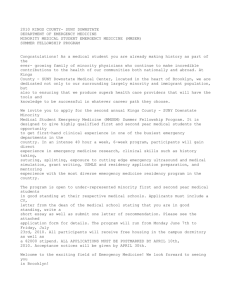21st Annual - Arthur Ashe Institute for Urban Health
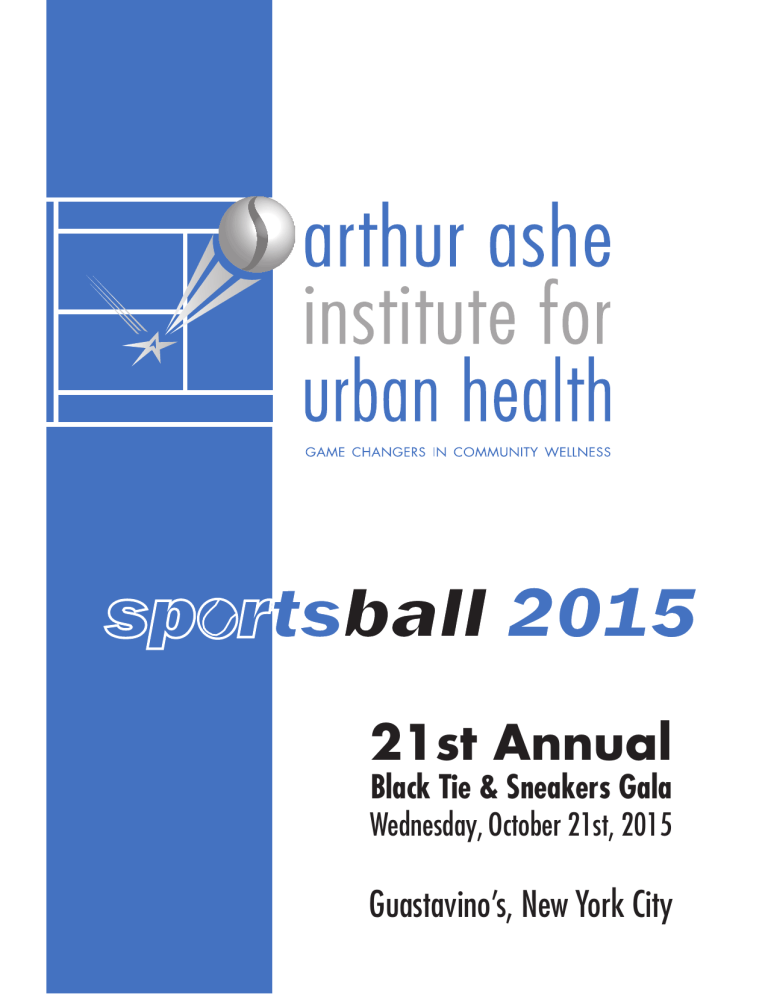
21st Annual
Black Tie & Sneakers Gala
Wednesday, October 21st, 2015
Guastavino’s, New York City
Board of Directors
OFFICERS:
Chief Executive Officer
Ruth C. Browne, Sc.D.
Chairperson
Edgar Mandeville, M.D.
Harlem Hospital Center
1st Vice Chairperson
Michael A. Stocker, M.D.
2nd Vice Chairperson
Kristen S. Williams
AstraZeneca
Vice Chairperson
Seth G. Abraham
Starship SA LLP
Vice Chairperson
Kenneth I. Chenault
American Express Company
Secretary
JoAnn Bradley, Ed.D
SUNY Downstate Medical Center
Treasurer
Robin Rosenblum
FOUNDING CHAIRPERSON:
Arthur Ashe
MEMBERS:
Henry W. Foster, M.D.
Meharry Medical College
Daisey M. Holmes
BNY Mellon
Heidi Kahn Leeds
Korn/Ferry International
Alvin Schragis
Doral Arrowwood Resort
& Conference Center
Patricia A. Sampson
American Express
Anne C. Vladeck
Vladeck, Raskin & Clark, P.C.
John F. Williams, M.D., Ed.D., M.P.H.,
FCCM
SUNY Downstate Medical Center
Jeff Williams
Tennis Magazine
Brett Wright
Uptown, UCA, Loot
About the Arthur Ashe Institute for Urban Health
The Arthur Ashe Institute for Urban Health (AAIUH) was founded in 1992 by the late tennis champion, activist and humanitarian,
Arthur Ashe. Headquartered in Brooklyn, New York, AAIUH is one of the country’s premier urban health organizations. Annually, AAIUH serves hundreds of under-represented individuals in Brooklyn through its signature programs. AAIUH also provides technical support and information for other organizations regionally and nationally, and has replicated one of its programs internationally. The Institute’s
22-year partnership with SUNY Downstate Medical Center is a national model for universities in partnership with communities.
Each year, thousands of urban Americans die from preventable diseases. AAIUH works to reverse this trend by focusing on increasing minority representation in the health professions, offering culturally appropriate health promotion services, and conducting community based research, which leads to effective wellness and disease prevention programs for underrepresented individuals, including those who have been formerly incarcerated.
Community Health Empowerment
AAIUH utilizes a model of Community Health Empowerment to connect people to information, tools and resources enabling them to make informed health decisions, which safeguard and improve the health of their families and neighborhoods by promoting wellness within their communities. Our health messages, based on current research, are tailored so that participants can act on them immediately and convey experience and outcomes to others, building a momentum of positive "social contagion" noted to be effective in decreasing both obesity and smoking.
Health Science Academy
The Academy increases the chances for high-achieving multiethnic urban school youth to succeed as college pre-medical and science majors, through a three-year program of instruction in anatomy, physiology, and health disparities. Over 450 students have graduated from the program and are attending top private and public universities. Since its inception, over 1,000 students have been served through the Institute’s Health Science Academy program.
Community Outreach Health Promotion
Using nontraditional sites such as hair salons, barbershops, public housing, body piercing, tattoo salons, laundromats, and places of worship. The Institute provides training that meets people where they are, both literally and figuratively. The community outreach program has reached thousands of people in more than 450 community-based establishments in New York and Philadelphia. Some of our current community outreach initiatives include the following:
Barbershop Talk with Brothers (BTWB)
BTWB is a barbershop-based HIV risk reduction initiative for heterosexual African-American men, and is conducted in partnership with
SUNY Downstate Medical Center through the Brooklyn Health Disparities Center. This program provides critical information on
HIV/AIDS and prostate cancer to over 800 men.
Ready, Set, PrEP is a salon and barbershop-based HIV/AIDS risk reduction initiative sponsored by Gilead. Through this program, barbers and stylists are trained to deliver information on HIV risk reduction strategies, including Pre-Exposure Prophylaxis (PrEP); customers/clients will receive tailored text messages on HIV/AIDS.
Obstructive Sleep Apnea Project (OSA)
OSA is a community-based intervention to increase awareness of Obstructive Sleep Apnea (OSA) in African-American/Afro-Caribbean individuals in Brooklyn. The project, conducted in partnership with SUNY Downstate Medical Center through the Brooklyn Health
Disparities Center, will screen over 1000 individuals to ascertain their risk for sleep apnea.
Health & Wellness Events are regularly scheduled health promotion sessions conducted at community-centered venues such as barbershops, salons and faith-based organizations, which provide health information, blood pressure screening, and additional resources to link individuals to services and care.
Capacity Building Training Initiatives
Health disparities & research training opportunities are provided to high school students through the Brooklyn Health Disparities Center
(BHDC), a partnership between the AAIUH, the SUNY Downstate Medical Center and the Office of the Brooklyn Borough President.
The Center’s community engagement core conducts a 4-week summer internship program in which high school students receive training on health issues, social determinants of health, and are engaged in research at local Community-Based Organizations (CBOs).
This program was replicated in Trinidad & Tobago, and conducted in collaboration with the University of the West Indies. Community-
Based Participatory Research (CBPR) trainings are hosted for members of CBOs to increase their capacity to fully engage in research.
Community Partnerships
AAIUH also provides leadership to various advisory boards and steering committees. These partnerships leverage the resources and talents in communities towards overall community health improvement (i.e. addressing preventable illness, developing culturally competent health communication strategies, increasing the participation of racially and ethnically diverse youth in health science educational and training programs, and eliminating racial, ethnic and gender disparities in health).
“To achieve greatness, start where you are, use what you have, do what you can”. Arthur Ashe
About the Arthur Ashe Institute for Urban Health
The Arthur Ashe Institute for Urban Health (AAIUH) was founded in 1992 by the late tennis champion, activist and humanitarian,
Arthur Ashe. Headquartered in Brooklyn, New York, AAIUH is one of the country’s premier urban health organizations. Annually, AAIUH serves hundreds of under-represented individuals in Brooklyn through its signature programs. AAIUH also provides technical support and information for other organizations regionally and nationally, and has replicated one of its programs internationally. The Institute’s
22-year partnership with SUNY Downstate Medical Center is a national model for universities in partnership with communities.
Each year, thousands of urban Americans die from preventable diseases. AAIUH works to reverse this trend by focusing on increasing minority representation in the health professions, offering culturally appropriate health promotion services, and conducting community based research, which leads to effective wellness and disease prevention programs for underrepresented individuals, including those who have been formerly incarcerated.
Community Health Empowerment
AAIUH utilizes a model of Community Health Empowerment to connect people to information, tools and resources enabling them to make informed health decisions, which safeguard and improve the health of their families and neighborhoods by promoting wellness within their communities. Our health messages, based on current research, are tailored so that participants can act on them immediately and convey experience and outcomes to others, building a momentum of positive "social contagion" noted to be effective in decreasing both obesity and smoking.
Health Science Academy
The Academy increases the chances for high-achieving multiethnic urban school youth to succeed as college pre-medical and science majors, through a three-year program of instruction in anatomy, physiology, and health disparities. Over 450 students have graduated from the program and are attending top private and public universities. Since its inception, over 1,000 students have been served through the Institute’s Health Science Academy program.
Community Outreach Health Promotion
Using nontraditional sites such as hair salons, barbershops, public housing, body piercing, tattoo salons, laundromats, and places of worship. The Institute provides training that meets people where they are, both literally and figuratively. The community outreach program has reached thousands of people in more than 450 community-based establishments in New York and Philadelphia. Some of our current community outreach initiatives include the following:
Barbershop Talk with Brothers (BTWB)
BTWB is a barbershop-based HIV risk reduction initiative for heterosexual African-American men, and is conducted in partnership with
SUNY Downstate Medical Center through the Brooklyn Health Disparities Center. This program provides critical information on
HIV/AIDS and prostate cancer to over 800 men.
Ready, Set, PrEP is a salon and barbershop-based HIV/AIDS risk reduction initiative sponsored by Gilead. Through this program, barbers and stylists are trained to deliver information on HIV risk reduction strategies, including Pre-Exposure Prophylaxis (PrEP); customers/clients will receive tailored text messages on HIV/AIDS.
Obstructive Sleep Apnea Project (OSA)
OSA is a community-based intervention to increase awareness of Obstructive Sleep Apnea (OSA) in African-American/Afro-Caribbean individuals in Brooklyn. The project, conducted in partnership with SUNY Downstate Medical Center through the Brooklyn Health
Disparities Center, will screen over 1000 individuals to ascertain their risk for sleep apnea.
Health & Wellness Events are regularly scheduled health promotion sessions conducted at community-centered venues such as barbershops, salons and faith-based organizations, which provide health information, blood pressure screening, and additional resources to link individuals to services and care.
Capacity Building Training Initiatives
Health disparities & research training opportunities are provided to high school students through the Brooklyn Health Disparities Center
(BHDC), a partnership between the AAIUH, the SUNY Downstate Medical Center and the Office of the Brooklyn Borough President.
The Center’s community engagement core conducts a 4-week summer internship program in which high school students receive training on health issues, social determinants of health, and are engaged in research at local Community-Based Organizations (CBOs).
This program was replicated in Trinidad & Tobago, and conducted in collaboration with the University of the West Indies. Community-
Based Participatory Research (CBPR) trainings are hosted for members of CBOs to increase their capacity to fully engage in research.
Community Partnerships
AAIUH also provides leadership to various advisory boards and steering committees. These partnerships leverage the resources and talents in communities towards overall community health improvement (i.e. addressing preventable illness, developing culturally competent health communication strategies, increasing the participation of racially and ethnically diverse youth in health science educational and training programs, and eliminating racial, ethnic and gender disparities in health).
“To achieve greatness, start where you are, use what you have, do what you can”. Arthur Ashe
Arthur Ashe
Winning the U.S. Open in 1968 at the age of 25 was only the beginning of a remarkable career for Arthur Ashe. Overall, he won 51 titles and was ranked among the top five players in the world for 13 consecutive years. He won the Australian Open in 1970 and Wimbledon in 1975, making him the first and only African-American man in history ever to take such honors. Arthur was also a member of the international Davis
Cup Team and served as captain from 1981 to 1985. In 1997, the
Arthur Ashe Stadium was built in a $254 million expansion of the
National Tennis Center in Flushing, NY, home of the U.S. Open. “Arthur
Ashe was an outstanding tennis player,” former USTA president Harry A.
Marmion said, “but we named our stadium in his honor because Arthur
Ashe was the finest human being the sport of tennis has ever known.”
Few athletes have used their public stature to further human rights as effectively as did Arthur Ashe. In 1968, he helped create the USTA
National Junior Tennis League, which has introduced tennis to thousands of inner-city youth. In 1970, Arthur successfully fought to have South
Africa expelled from the International Lawn Tennis Federation for human and civil rights violations.
Arthur suffered a heart attack in 1980, which forced him to retire at age
37. Two years before the testing of the blood supply was to become mandatory in the United States, he contracted HIV from a blood transfusion performed during open-heart surgery.
In his resolve to fight HIV as he fought all other foes, he founded the
Arthur Ashe Foundation for the Defeat of AIDS, received the First Annual
AIDS Leadership Award from the Harvard AIDS Institute, and addressed the United Nations on World AIDS Day.
On December 3, 1992, only two months before he died, Arthur created the Arthur Ashe Institute for Urban Health when he learned that more than 100,000 children and adults suffer and die each year of preventable diseases. He was extremely concerned about health care delivery in urban America.
Arthur knew that the disproportionate level of illness and death in our nation’s urban multi-ethnic communities was not only caused by inadequate care delivery, but also by late detection—due to limited or no health insurance and often culturally inappropriate health education.
Unfortunately, poor health care remains a critical situation. For example, in 2001, the Institute of Medicine (in its report Unequal Treatment) documented gross disparities in the health status, treatment, and health care utilization of African Americans and other minorities, including
Latinos, Asian Americans, and Native Americans. The Institute is a national tax-exempt charity headquartered in Brooklyn, NY. Its innovative community health education and research initiatives serve as models for replication in urban communities throughout the nation.
Hosts
Cheryl Wills
NY1 News
Dean Meminger
NY1 News
Registration & Cocktail Reception
6:00 pm - 7:00 pm
Dinner & Awards Ceremony
7:00 pm - 8:30 pm
Dessert, Dancing,
Games, Silent Auction
8:30 pm - 10:00 pm
Each Sports Ball guest will receive a complimentary pair of Reebok sneakers.
Menu
Appetizer
Tuscan Kale and Brussel Sprout Salad with
Toasted Walnut, Lemon and Maple Vinaigrette
Entrée
Mustard Crusted Breast of Chicken,
Caramelized Brussel Sprouts, Fingerling Potato, Jus Natural
Join us downstairs after dinner for dessert & dancing!
“From what we get, we can make a living.
What we give, however, makes a life”. Arthur Ashe
Arthur Ashe
Winning the U.S. Open in 1968 at the age of 25 was only the beginning of a remarkable career for Arthur Ashe. Overall, he won 51 titles and was ranked among the top five players in the world for 13 consecutive years. He won the Australian Open in 1970 and Wimbledon in 1975, making him the first and only African-American man in history ever to take such honors. Arthur was also a member of the international Davis
Cup Team and served as captain from 1981 to 1985. In 1997, the
Arthur Ashe Stadium was built in a $254 million expansion of the
National Tennis Center in Flushing, NY, home of the U.S. Open. “Arthur
Ashe was an outstanding tennis player,” former USTA president Harry A.
Marmion said, “but we named our stadium in his honor because Arthur
Ashe was the finest human being the sport of tennis has ever known.”
Few athletes have used their public stature to further human rights as effectively as did Arthur Ashe. In 1968, he helped create the USTA
National Junior Tennis League, which has introduced tennis to thousands of inner-city youth. In 1970, Arthur successfully fought to have South
Africa expelled from the International Lawn Tennis Federation for human and civil rights violations.
Arthur suffered a heart attack in 1980, which forced him to retire at age
37. Two years before the testing of the blood supply was to become mandatory in the United States, he contracted HIV from a blood transfusion performed during open-heart surgery.
In his resolve to fight HIV as he fought all other foes, he founded the
Arthur Ashe Foundation for the Defeat of AIDS, received the First Annual
AIDS Leadership Award from the Harvard AIDS Institute, and addressed the United Nations on World AIDS Day.
On December 3, 1992, only two months before he died, Arthur created the Arthur Ashe Institute for Urban Health when he learned that more than 100,000 children and adults suffer and die each year of preventable diseases. He was extremely concerned about health care delivery in urban America.
Arthur knew that the disproportionate level of illness and death in our nation’s urban multi-ethnic communities was not only caused by inadequate care delivery, but also by late detection—due to limited or no health insurance and often culturally inappropriate health education.
Unfortunately, poor health care remains a critical situation. For example, in 2001, the Institute of Medicine (in its report Unequal Treatment) documented gross disparities in the health status, treatment, and health care utilization of African Americans and other minorities, including
Latinos, Asian Americans, and Native Americans. The Institute is a national tax-exempt charity headquartered in Brooklyn, NY. Its innovative community health education and research initiatives serve as models for replication in urban communities throughout the nation.
Hosts
Cheryl Wills
NY1 News
Dean Meminger
NY1 News
Registration & Cocktail Reception
6:00 pm - 7:00 pm
Dinner & Awards Ceremony
7:00 pm - 8:30 pm
Dessert, Dancing,
Games, Silent Auction
8:30 pm - 10:00 pm
Each Sports Ball guest will receive a complimentary pair of Reebok sneakers.
Menu
Appetizer
Tuscan Kale and Brussel Sprout Salad with
Toasted Walnut, Lemon and Maple Vinaigrette
Entrée
Mustard Crusted Breast of Chicken,
Caramelized Brussel Sprouts, Fingerling Potato, Jus Natural
Join us downstairs after dinner for dessert & dancing!
“From what we get, we can make a living.
What we give, however, makes a life”. Arthur Ashe
Honorees
AstraZeneca pushes the boundaries of science to deliver life-changing medicine. Their primary focus is on three important areas of healthcare: Cardiovascular and Metabolic disease (CVMD); Oncology; and Respiratory, Inflammation and Autoimmunity (RIA). They are also active in the Infection, Neuroscience and Gastrointestinal (ING) disease areas. AstraZeneca is one of only a handful of pure-play biopharmaceutical companies to span the entire value chain of a medicine from discovery, early- and late-stage development to manufacturing and distribution, and the global commercialisation of primary care, specialty care-led and specialty care medicines that transform lives. They operate in more than 100 countries and their innovative medicines are used by millions of patients worldwide.
Launched in 2010, AstraZeneca’s Young Health Programme (YHP) has a unique focus on young people and the prevention of most common NCD (non-communicable diseases), such as type 2 diabetes, cancer, and heart and respiratory disease. Working with over 30 expert organisations and combining on-the-ground programmes, research and advocacy, it targets the risk behaviours, such as tobacco use, alcohol abuse and unhealthy eating that can lead to these diseases in adulthood. A particular focus is placed on working with marginalised young people. Since 2010, AstraZeneca has reached over 1.2 million young people in 18 countries, across five continents.
Over 9,500 young people have been trained to share health information with their peers and the community and over 10,000 frontline health providers have been trained in adolescent health
As the most famous face in daytime television history, Susan Lucci held audiences spellbound for years as the "woman you love to hate," Erica Kane on ABC-TV's "All My Children." In 1999 she won the Emmy Award for "Best Actress." Lucci currently stars in the hit Lifetime series, "Devious Maids." In 2015, Lucci was honored with the Disney Legends Award.
She received a Star on the Hollywood Walk of Fame in 2005 and was inducted into the Broadcasting Hall of Fame in
2006. She is proud to serve as an Ambassador for the newly established National Women's Museum in Washington, DC.
Lucci was named one of E! Entertainment's "Top Entertainers of the Year" as well as one of Barbara Walters' "Ten Most
Fascinating People." VH-1 has also named Lucci one of its"200 Top Icons of all Time." Her autobiography, “All My Life”, was published in 2011 and was a New York Times bestseller.
Lucci's commitment to her work with children has taken her to Africa in support of Feed the Children. She and her husband have been ongoing champions of Little Flower Children and Family Services of New York and have been the spokespersons for the National AFib Campaign. She currently hosts United Cerebral Palsy of NYC Women Who Care Luncheon. She has served as the March of Dimes' National Ambassador in 2000 and as a celebrity spokesperson for AMDeC (Academic
Medicine Development Company) and The New York Cancer Project. She has also been involved with Broadway Cares
Equity Fights Aids and is the recipient of the Ellis Island Medal of Honor.
Susan Lucci
Actress, Author, Entrepreneur
Gary A. Puckrein, PhD, is President and Chief Executive Officer of the National Minority Quality Forum (formerly the
National Minority Health Month Foundation), a not-for-profit organization that he founded in 1998. The Forum addresses the critical need for strengthening national and local efforts to use evidence-based, data-driven initiatives to guide programs to eliminate the disproportionate burden of premature death and preventable illness for racial and ethnic minorities and other special populations. Dr. Puckrein also serves as the Executive Director of the Alliance of Minority
Medical Associations (a collaborative effort of the Asian and Pacific Physicians’ Association, the Association of American
Indian Physicians, the Interamerican College of Physicians and Surgeons, and the National Medical Association), which was formed on the basis of evidence-based data that highlight significant disparities in health-care treatment plans.
Dr. Gary A. Puckrein
President and Chief Executive Officer
National Minority Quality Forum
Dr. Puckrein graduated Phi Beta Kappa from Brown University, where he received his master’s degree (1974) and doctorate (1978). Between 1974 and 1992, he taught and lectured at Roger Williams College, Brown University,
Connecticut College, and Rutgers University, where he was a tenured member of the faculty. Dr. Puckrein has received many awards and honors, including being named a visiting scholar and fellow at the Smithsonian’s National Museum of
American History and a visiting fellow at Princeton University.
Honorees
Tim Morehouse is a 3-time Olympic team member, Silver Medalist and 2x National Champion who has a unique background in education, sports, media and technology. Morehouse was a member of the Teach for America program while training for the Olympics and he now runs his own Foundation Fencing In the Schools that brings fencing to low-income schools around the country. Genx Sports is Tim's technology company that is developing wearable electronics to help revolutionize the sport of fencing in conjunction with IDEO. Tim has been a Special Correspondent for E! News and hosted episodes of AOL Build along with conferences such as Tedx Orange Coast and the AAU Sullivan awards.
Tim Morehouse
Olympic Silver Medalist, Fencing
Founder, Fencing in the Schools
Tim was honored by President Obama at the White House in 2012 as a Champion for Change and he most recently was named an "Athlete in Excellence" by the Foundation for Global Sports development in 2014. He has given keynotes and spoken at conferences at The White House, Capitol Hill, The United Nations and at numerous fortune 500 companies and has been profiled by the New York Times. Tim was the lead male host for the US Open's "Beyond the Baseline" show that was produced by IMG Productions and aired on ESPN3. Tim is currently starring in the Chase Mastery Campaign along with
Serena Williams, Nick Cannon and The Rockettes and he taught President Obama to fence at the White House.
John F. Williams , MD, EdD, MPH, FCCM, is the 16th President of SUNY Downstate
Medical Center, a position he has held since 2012. He is also Professor of Anesthesiology, Critical Care Medicine, and Public Health at Downstate.
As president of Downstate, Williams has promoted collaboration and a multidisciplinary focus across the academic and clinical disciplines as he has guided the University through a period of significant financial challenges; developed an innovative health care delivery system model for Brooklyn; transformed the clinical operation to align with population health management and federal and state reform initiatives; advanced Downstate’s role as Brooklyn’s hub of health education, biomedical research, and clinical care; engaged Downstate in long-term planning to develop new models of integrated, value based, and patient-centered care; established programs and policies to improve infrastructure and drive sustainability; and launched forward-looking initiatives to ensure responsible stewardship of Downstate’s resources.
Previously, Dr. Williams was Provost and Vice President for Health Affairs at The George Washington University. He also served as Dean of the School of Medicine and Vice President for Graduate Medical Education at the School of Medicine and Health Sciences, and
Associate and Assistant Dean for Admissions for the School of Medicine and Health Sciences. He was a member of the faculty for 28 years and is Professor Emeritus at George Washington University. Raised in Crown Heights, NY, Williams went on to earn a Bachelor of Arts from Boston University in 1970, a Master of Science from The London School of Economics and Political Science in 1973, a
Dr. John F. Williams
President, SUNY Downstate
Medical Center
Masters of Public Health from Yale University in 1975, and Doctorates of Medicine (1970) and Education (1996) from George Washington University.
Ivan D. Smith
Partner, Hinshaw
& Culbertson, LLP
Ivan Smith devotes his practice to labor and employment law and litigation, and entertainment law. He has substantial experience in employment discrimination cases, with particular emphasis in class and multi-plaintiff cases that are both regional and national in scope. His clients have spanned many industries, including education, healthcare, sports, entertainment, food service, hotel, construction, maintenance, shipping, airline, trucking and engineering, and he has represented them in collective bargaining, contract and grievance arbitrations, litigation pertaining to unfair labor practices and matters before the National Labor Relations Board. Smith's entertainment practice includes representing Rock and Roll Hall of Fame and Grammy- and Emmy-award-winning producers, writers, directors and artists in the music, television and film industries. Smith also serves as general counsel to various not-for-profit groups.
Smith joined Hinshaw & Culbertson LLP in October 2013. Previously he was for six years a partner at Lewis Brisbois Bisgaard & Smith
LLP, where he was the administrative partner in New York, as well as a co-chair of its entertainment practice, and vice chair of its labor and employment group. He began his legal career at Vladeck, Waldman, Elias & Engelhard, P.C. as an associate in 1989. He became a partner there in 1995, and served as Managing Partner of the firm from 1996 to 2007. From 1991 to 2009, Smith served as an adjunct professor for the Cornell University Industrial School of Labor Relations. Smith is often sought for legal commentary by such publications and programs as Time Magazine, Black Enterprise Magazine and the television program, Court TV. He has been featured on 60 Minutes on CBS News, in a story titled "Southern Exposure."
“Now as never before our moral, intellectual and material wealth will depend on the strength, skills and productivity of our youth”. Arthur Ashe
Honorees
Tim Morehouse is a 3-time Olympic team member, Silver Medalist and 2x National Champion who has a unique background in education, sports, media and technology. Morehouse was a member of the Teach for America program while training for the Olympics and he now runs his own Foundation Fencing In the Schools that brings fencing to low-income schools around the country. Genx Sports is Tim's technology company that is developing wearable electronics to help revolutionize the sport of fencing in conjunction with IDEO. Tim has been a Special Correspondent for E! News and hosted episodes of AOL Build along with conferences such as Tedx Orange Coast and the AAU Sullivan awards.
Tim Morehouse
Olympic Silver Medalist, Fencing
Founder, Fencing in the Schools
Tim was honored by President Obama at the White House in 2012 as a Champion for Change and he most recently was named an "Athlete in Excellence" by the Foundation for Global Sports development in 2014. He has given keynotes and spoken at conferences at The White House, Capitol Hill, The United Nations and at numerous fortune 500 companies and has been profiled by the New York Times. Tim was the lead male host for the US Open's "Beyond the Baseline" show that was produced by IMG Productions and aired on ESPN3. Tim is currently starring in the Chase Mastery Campaign along with
Serena Williams, Nick Cannon and The Rockettes and he taught President Obama to fence at the White House.
John F. Williams , MD, EdD, MPH, FCCM, is the 16th President of SUNY Downstate
Medical Center, a position he has held since 2012. He is also Professor of Anesthesiology, Critical Care Medicine, and Public Health at Downstate.
As president of Downstate, Williams has promoted collaboration and a multidisciplinary focus across the academic and clinical disciplines as he has guided the University through a period of significant financial challenges; developed an innovative health care delivery system model for Brooklyn; transformed the clinical operation to align with population health management and federal and state reform initiatives; advanced Downstate’s role as Brooklyn’s hub of health education, biomedical research, and clinical care; engaged Downstate in long-term planning to develop new models of integrated, value based, and patient-centered care; established programs and policies to improve infrastructure and drive sustainability; and launched forward-looking initiatives to ensure responsible stewardship of Downstate’s resources.
Previously, Dr. Williams was Provost and Vice President for Health Affairs at The George Washington University. He also served as Dean of the School of Medicine and Vice President for Graduate Medical Education at the School of Medicine and Health Sciences, and
Associate and Assistant Dean for Admissions for the School of Medicine and Health Sciences. He was a member of the faculty for 28 years and is Professor Emeritus at George Washington University. Raised in Crown Heights, NY, Williams went on to earn a Bachelor of Arts from Boston University in 1970, a Master of Science from The London School of Economics and Political Science in 1973, a
Dr. John F. Williams
President, SUNY Downstate
Medical Center
Masters of Public Health from Yale University in 1975, and Doctorates of Medicine (1970) and Education (1996) from George Washington University.
Ivan D. Smith
Partner, Hinshaw
& Culbertson, LLP
Ivan Smith devotes his practice to labor and employment law and litigation, and entertainment law. He has substantial experience in employment discrimination cases, with particular emphasis in class and multi-plaintiff cases that are both regional and national in scope. His clients have spanned many industries, including education, healthcare, sports, entertainment, food service, hotel, construction, maintenance, shipping, airline, trucking and engineering, and he has represented them in collective bargaining, contract and grievance arbitrations, litigation pertaining to unfair labor practices and matters before the National Labor Relations Board. Smith's entertainment practice includes representing Rock and Roll Hall of Fame and Grammy- and Emmy-award-winning producers, writers, directors and artists in the music, television and film industries. Smith also serves as general counsel to various not-for-profit groups.
Smith joined Hinshaw & Culbertson LLP in October 2013. Previously he was for six years a partner at Lewis Brisbois Bisgaard & Smith
LLP, where he was the administrative partner in New York, as well as a co-chair of its entertainment practice, and vice chair of its labor and employment group. He began his legal career at Vladeck, Waldman, Elias & Engelhard, P.C. as an associate in 1989. He became a partner there in 1995, and served as Managing Partner of the firm from 1996 to 2007. From 1991 to 2009, Smith served as an adjunct professor for the Cornell University Industrial School of Labor Relations. Smith is often sought for legal commentary by such publications and programs as Time Magazine, Black Enterprise Magazine and the television program, Court TV. He has been featured on 60 Minutes on CBS News, in a story titled "Southern Exposure."
“Now as never before our moral, intellectual and material wealth will depend on the strength, skills and productivity of our youth”. Arthur Ashe
Sports Ball 2015 All-Star Team
WIMBLEDON
SUNY Downstate Medical Center
US OPEN
American Express
AstraZeneca
Vladeck, Raskin & Clark, P.C.
FRENCH OPEN
BNY Mellon
Macy’s
AUSTRALIAN OPEN
The Abraham Family
American Benefits Consulting
Anthem
BMW
Gilead Sciences
GNYHA Ventures
Healthfirst
Hinshaw & Culbertson LLP
Korn Ferry
Maimonides Medical Center
MetLife
The Stocker Family
USTA
Wyckoff Medical Center
ACKNOWLEDGEMENTS
Special thanks to
Sharon Carter-Jones, Doral Arrowwood,
Judith Ripka & The Helping Hand Team,
Memorabilia Magic, Penn, and Reebok.
SPORTS BALL PRODUCTION TEAM
Wanda Mann, Executive Producer
LeeAnn Hicks, Producer
Mark Fortgang
Tim Mann
Silent Crow Arts
Gala Productions
Publicity managed by JGPR – James Grant Public Relations
be a game changer
